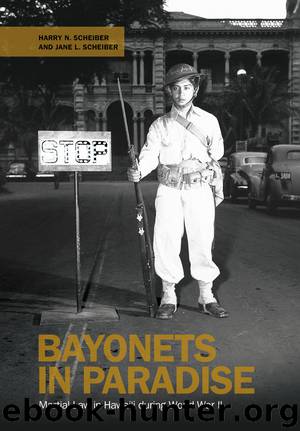Bayonets in Paradise by Harry N. Scheiber

Author:Harry N. Scheiber
Language: eng
Format: epub
ISBN: 9780824852900
Publisher: University of Hawaii Press
The Zimmerman Case on Appeal in the Ninth Circuit, 1942–1943
While being held again in Hawai‘i, Zimmerman instituted an appeal to the U.S. Ninth Circuit Court of Appeals of Judge Metzger’s decision not to hear the petition. The briefs of counsel and amici for the Ninth Circuit panel in the Zimmerman appeal, submitted on September 17, 1942, presented very ably the key legal and constitutional issues that would run through a line of subsequent cases testing martial law—including the issues that three years later would be at the core of arguments and the justices’ opinions in the Duncan case in the Supreme Court. The government’s defense of the army rested squarely on the arguments from “necessity” in emergencies threatening the public safety, but especially from “military necessity” in wartime. Asking the court to take judicial notice—that is, to acknowledge, without need for formal argument on the evidence, the emergency created by the Pearl Harbor attack—their brief stressed that when Metzger ruled, there was hard combat going on in the Pacific theater of war. Martial law had been declared in the context of these developments, the government’s brief contended; and in light of these same circumstances, it would be improper for the appellate court to assume authority to review the military’s judgment as to “necessity” for martial rule. The government further contended that the review board’s determination that Zimmerman was a security risk should be taken as sufficient cause and justification for his internment, even though the procedure had been extraordinary.33 In a word, the army wanted the court to stand back and leave it free to do whatever was deemed necessary in light of the war emergency.
Counsel for Zimmerman, supported by the American Civil Liberties Union in an impressively argued amicus brief, argued from the principles in the 1866 decision in Milligan that the constitutional conditions for imposition of martial law were not fulfilled in Hawai‘i. The ACLU brief, written by A. L. Wirin, also contended that close scrutiny must be given, as mandated by the famous Carolene dictum by Chief Justice Stone, to any governmental suppression of individual liberties essential to the political process.34 The briefs maintained that the government’s “vague intimations” as to emergency conditions in Hawai‘i, allegedly warranting incarceration of a United States citizen without even the most rudimentary kind of due process, constituted an entirely insufficient factual basis for a ruling. The court should indeed take “judicial notice” of actual conditions in Hawai‘i, they declared, just as the government had contended; but here the argument went to the opposite conclusion: the judges should take notice of the factual context so that they might make independent judgments as to whether the “military necessity” was such as to actually warrant suspension of all traditional guarantees of due process. To accept without careful scrutiny the army’s interpretation of the facts, the brief concluded, would be to abdicate the proper role of the court.35
A curious sidelight to the Ninth Circuit appeal was the submission—rather to the chagrin of the army lawyers,
Download
This site does not store any files on its server. We only index and link to content provided by other sites. Please contact the content providers to delete copyright contents if any and email us, we'll remove relevant links or contents immediately.
2010-The City & the City by China Miéville(1528)
Anatomy of Injustice by Raymond Bonner(1273)
ADHD on Trial by Michael Gordon(1247)
That Every Man Be Armed by Stephen P. Halbrook(1245)
Injustices by Ian Millhiser(1204)
You Don't Own Me by Orly Lobel(1151)
Tell by Major Margaret Witt(1108)
A Vast Conspiracy by Jeffrey Toobin(1070)
Course Correction by Ginny Gilder(1054)
Broken Scales by Joel Cohen(1027)
J by Howard Jacobson(994)
First by Evan Thomas(993)
Without Copyrights by Spoo Robert(984)
The Run of His Life: The People v. O. J. Simpson by Jeffrey Toobin(966)
A Religious Orgy in Tennessee by H.L. Mencken(956)
A Triumph of Genius: Edwin Land, Polaroid, and the Kodak Patent War by Ronald K. Fierstein(911)
A History Of Thailand by Baker Chris(896)
Law 101: Everything You Need to Know About American Law, Fourth Edition by Jay Feinman(854)
John Wayne Gacy by Judge Sam Amirante(848)
